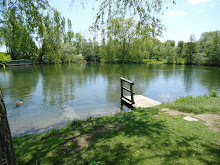Wednesday, April 23, 2025
A Morning Turned Dark: A Kashmiri Hindu's Reflections on the Pahalgam Terror Attack
You wake up to a new day with optimism in your heart, ready to embrace the freshness of spring — a season that brings hope, renewal, and a sense of peace. There’s a list of things to do, goals to chase, memories to make. But then, as you casually turn on the television or scroll through the news, your heart sinks.
A terrorist attack in Pahalgam, Kashmir.
And just like that, the serenity of the morning shatters. A deep sadness replaces the calm. You are left grappling with one question — how can anyone be so barbaric, so inhuman?
What was the crime of those people who were attacked? All they wanted was to visit what has always been called “Paradise on Earth.” They weren’t there for any political reason or controversy. They were simply tourists — families, children, elders — people seeking joy, nature, and a break from their everyday struggles. People who invested their time and money into experiencing the magic of Kashmir. In doing so, they not only nourished their own souls, but they also helped the local economy — contributing to the livelihoods of countless Kashmiris by spending on travel, accommodation, food, and local goods.
I was in Kashmir myself in November 2024. And I saw the transformation — the peaceful energy, the smiling faces of local people, the thriving tourism industry. It was not the Kashmir we left behind in the 1990s — full of tension and uncertainty. It was a place alive with color, warmth, and hope. The happiness was palpable, and much of it stemmed from the influx of tourists — fellow Indians who come to admire the beauty, and in return, uplift the region economically and socially.
But today, I am not just only saddened but outraged as well.
As a Kashmiri Hindu, I cannot hold back the pain that surfaces every time something like this happens. I was among those who were forced to flee their homes in 1990 by jihadist forces — rendered homeless in our own country. And even decades later, the wounds are fresh. So why does this keep happening, time and again, whether in Kashmir or Murshidabad?
Just sink this in — in a Hindu-majority country, hundreds of thousands of Kashmiri Hindus were made to leave their homes, their land, their temples. Innocent Hindus are still being targeted and killed based solely on their religion be it in Murshidabad or Sambal. Can you imagine the reverse happening anywhere else in the world — say, a Hindu in Pakistan picking up an AK-47 and going on a rampage against Muslims? It’s unimaginable. It can happen only with a Hindu, because a Hindu is always a soft target, whether in India, the USA, or even in Canada, my adopted homeland.
And why is that? Perhaps, we are to blame. Because no one criticizes Hindus more than Hindus themselves. Have you ever seen a Muslim public figure speaking out against the atrocities in Gaza or Palestine in their own circles? Rarely. But you’ll find countless Hindus blaming their own people, questioning their culture, their beliefs, and their very identity.
Then you have people like Robert Vadra — and I say this with pained reluctance — who claims that Kashmiris took up arms because they were oppressed. Really? So by that logic, shouldn't Kashmiri Hindus, who were truly oppressed, displaced, and brutalized, have also taken up arms? But we didn’t. Because our culture doesn’t teach violence. It teaches resilience. It teaches Sanatan Dharma.
And who are these so-called oppressed people? They have complete control of the Kashmir Valley, enjoy religious freedom, and have more mosques than ever — some even built on public land. They travel freely across India, run businesses in Goa, Kerala, Mumbai, and no one stops them. But how many non-Kashmiris can own a shop or property in the Valley? Very few. Because to them, we are just money machines, not fellow Indians.
Now, let's ask the hard question — could this attack have happened without local support? Do we really believe those terrorists prepared for this operation in isolation, without food, shelter, or surveillance? They likely had help. Someone sheltered them. Fed them. Guided them. And those aiding the killers must be held accountable. We must strike where it hurts the most — economically.
They can wage war only if their stomachs are full. And who feeds them? Tourists. It is time we think seriously. If the government won’t act decisively, we — the people — can make a statement. Stop visiting Kashmir. Enough is enough.
India has no shortage of beauty. Let us shift our focus to places like Sikkim, Arunachal Pradesh, Himachal, Uttarakhand. Let's pump our money into regions where we are welcomed with respect and not fear. Where we can walk free as Hindus, as Indians, as human beings.
Think about this, my friends. Every small step matters. Only a few ancient nations in the world were colonized but still managed to preserve their identity and India is one of them. Take Iran, for example. Once Zoroastrian for over a millennium, now transformed into an Islamic Republic. There are countless such stories — but let’s not allow ours to be one of them.
Let us pledge, from wherever we are — whether in Bharat, Canada, or anywhere else — to protect and preserve our Sanatan Dharma, our culture, our values, and our people.
As I write this, I pray for the souls we lost. I pray for the families grieving in silence. I pray for a future where we don’t wake up to such news. Where spring means blooming flowers, not fresh tears.
Long live Bharat. Long live Canada. Long live Sanatan Dharma.
Deepak Razdan
Mississauga, Ontario, Canada.
Subscribe to:
Post Comments (Atom)

No comments:
Post a Comment